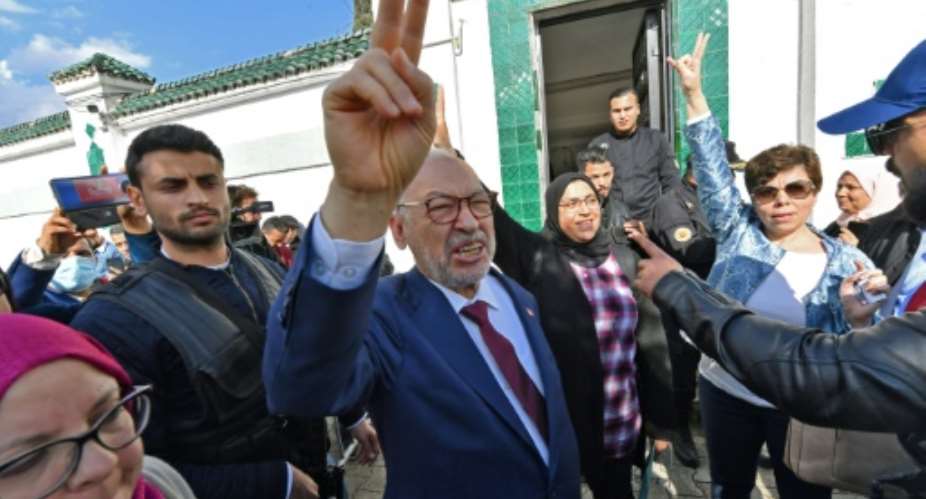The speaker of Tunisia's dissolved parliament was questioned Friday over allegations of "conspiracy against state security", after lawmakers met online in defiance of President Kais Saied.
Rached Ghannouchi, the 81-year-old speaker who also heads the Islamist-inspired Ennahdha party, attended in response to Thursday's summons from judicial authorities of the anti-terrorism unit, the parliament's leadership said in a statement.
An AFP photographer said Ghannouchi left the judicial premises in Tunis after about an hour of questioning.
He is accused of "having plotted against state security", said party spokesman Imed Khemiri, who was also summoned, dismissing the charge as setting a "dangerous precedent".
Ghannouchi has said at least 30 parliamentarians have been summoned for questioning by anti-terrorism police.
The president dissolved parliament on Wednesday, dealing another blow to the political system in place since the North African country's 2011 revolt which sparked the Arab Spring.
It came eight months after Saied sacked the government, froze parliament and seized sweeping powers, later moving to rule by decree in moves opponents have dubbed a "coup".
The president's latest decision came hours after MPs held a plenary session online -- their first since Saied's power grab -- and voted through a bill against his "exceptional measures".
Ghannouchi, who did not attend the session, subsequently rejected Saied's dissolution of parliament.
Many Tunisians initially welcomed Saied's moves against political parties often seen as self-serving and corrupt.
Some have blamed Ghannouchi's Ennahdha -- which has dominated Tunisia's post-revolution politics -- for Tunisia's political stalemate and economic problems faced over the past decade.
But Saied's moves have prompted accusations that he is taking Tunisia back towards autocracy.
Saied, a former law professor elected in 2019 amid public anger against the political class, has given himself powers to rule and legislate by decree, as well as seizing control over the judiciary.
The parliament building in Tunis has remained closed off and guarded by security forces for the past eight months.





 Election 2024: Bawumia to conduct house-to-house campaign
Election 2024: Bawumia to conduct house-to-house campaign
 Ejisu by-election: Arrest Kingsley Nyarko now – NDC to police
Ejisu by-election: Arrest Kingsley Nyarko now – NDC to police
 Urgently address ‘dumsor’ crisis – Organised Labour tells Akufo-Addo
Urgently address ‘dumsor’ crisis – Organised Labour tells Akufo-Addo
 24-hour economy will help restore Ghana from turbulent times and empower our wor...
24-hour economy will help restore Ghana from turbulent times and empower our wor...
 Bawumia to embark on campaign tour of Western North Region on May 3
Bawumia to embark on campaign tour of Western North Region on May 3
 Armed robbers attack Mobile Money agent in broad daylight at Tumu; made away wit...
Armed robbers attack Mobile Money agent in broad daylight at Tumu; made away wit...
 May Day: ICU-Ghana warns govt against short-changing public sector workers under...
May Day: ICU-Ghana warns govt against short-changing public sector workers under...
 May Day: ECG workers stage walkout against Ashanti Regional Minister
May Day: ECG workers stage walkout against Ashanti Regional Minister
 NPP govt bought Ejisu by-election with taxpayers’ money – CPP
NPP govt bought Ejisu by-election with taxpayers’ money – CPP
 Ejisu by-election: Arrest and prosecute Kingsley Nyarko over bribery incident – ...
Ejisu by-election: Arrest and prosecute Kingsley Nyarko over bribery incident – ...
